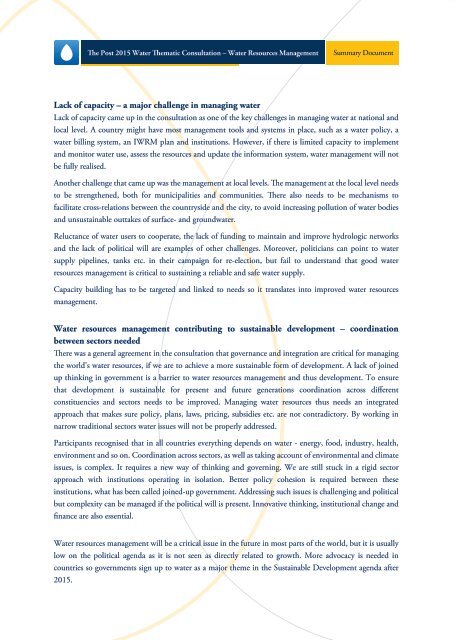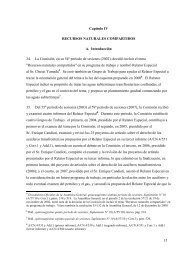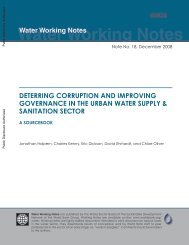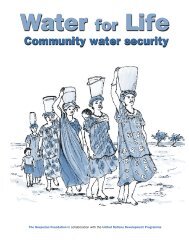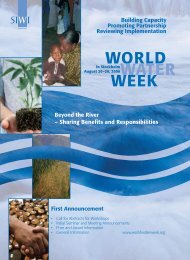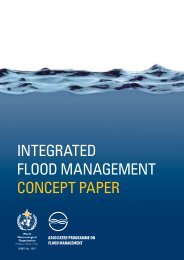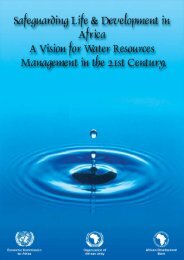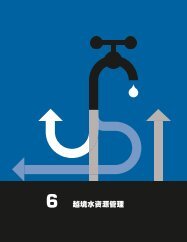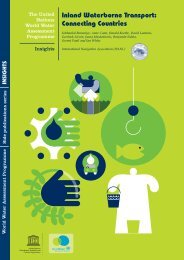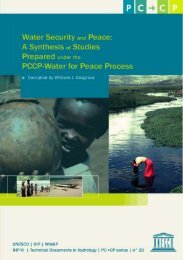Governing and Managing Water Resources for ... - UN-Water
Governing and Managing Water Resources for ... - UN-Water
Governing and Managing Water Resources for ... - UN-Water
Create successful ePaper yourself
Turn your PDF publications into a flip-book with our unique Google optimized e-Paper software.
The Post 2015 <strong>Water</strong> Thematic Consultation – <strong>Water</strong> <strong>Resources</strong> Management<br />
Summary Document<br />
Lack of capacity – a major challenge in managing water<br />
Lack of capacity came up in the consultation as one of the key challenges in managing water at national <strong>and</strong><br />
local level. A country might have most management tools <strong>and</strong> systems in place, such as a water policy, a<br />
water billing system, an IWRM plan <strong>and</strong> institutions. However, if there is limited capacity to implement<br />
<strong>and</strong> monitor water use, assess the resources <strong>and</strong> update the in<strong>for</strong>mation system, water management will not<br />
be fully realised.<br />
Another challenge that came up was the management at local levels. The management at the local level needs<br />
to be strengthened, both <strong>for</strong> municipalities <strong>and</strong> communities. There also needs to be mechanisms to<br />
facilitate cross-relations between the countryside <strong>and</strong> the city, to avoid increasing pollution of water bodies<br />
<strong>and</strong> unsustainable outtakes of surface- <strong>and</strong> groundwater.<br />
Reluctance of water users to cooperate, the lack of funding to maintain <strong>and</strong> improve hydrologic networks<br />
<strong>and</strong> the lack of political will are examples of other challenges. Moreover, politicians can point to water<br />
supply pipelines, tanks etc. in their campaign <strong>for</strong> re-election, but fail to underst<strong>and</strong> that good water<br />
resources management is critical to sustaining a reliable <strong>and</strong> safe water supply.<br />
Capacity building has to be targeted <strong>and</strong> linked to needs so it translates into improved water resources<br />
management.<br />
<strong>Water</strong> resources management contributing to sustainable development – coordination<br />
between sectors needed<br />
There was a general agreement in the consultation that governance <strong>and</strong> integration are critical <strong>for</strong> managing<br />
the world's water resources, if we are to achieve a more sustainable <strong>for</strong>m of development. A lack of joined<br />
up thinking in government is a barrier to water resources management <strong>and</strong> thus development. To ensure<br />
that development is sustainable <strong>for</strong> present <strong>and</strong> future generations coordination across different<br />
constituencies <strong>and</strong> sectors needs to be improved. <strong>Managing</strong> water resources thus needs an integrated<br />
approach that makes sure policy, plans, laws, pricing, subsidies etc. are not contradictory. By working in<br />
narrow traditional sectors water issues will not be properly addressed.<br />
Participants recognised that in all countries everything depends on water - energy, food, industry, health,<br />
environment <strong>and</strong> so on. Coordination across sectors, as well as taking account of environmental <strong>and</strong> climate<br />
issues, is complex. It requires a new way of thinking <strong>and</strong> governing. We are still stuck in a rigid sector<br />
approach with institutions operating in isolation. Better policy cohesion is required between these<br />
institutions, what has been called joined-up government. Addressing such issues is challenging <strong>and</strong> political<br />
but complexity can be managed if the political will is present. Innovative thinking, institutional change <strong>and</strong><br />
finance are also essential.<br />
<strong>Water</strong> resources management will be a critical issue in the future in most parts of the world, but it is usually<br />
low on the political agenda as it is not seen as directly related to growth. More advocacy is needed in<br />
countries so governments sign up to water as a major theme in the Sustainable Development agenda after<br />
2015.


